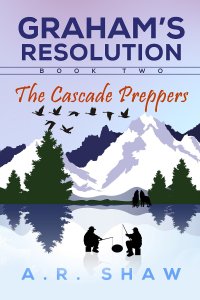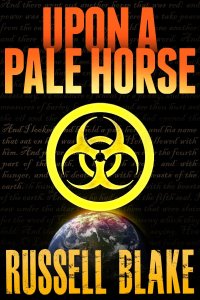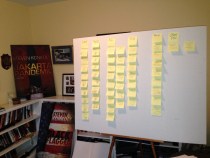against a surprisingly ill-informed source.
 For those of you that know me from my Academy days, I think this response will hold a ton of merit. Those of you that know me from my fleet days will appreciate and understand my “retort” even better. I have my own way of doing things, and neither the “Fleet” nor the United States Naval Academy made much of a dent in that mentality. If anything, they provided fertile ground for me to further hone that “talent.”
For those of you that know me from my Academy days, I think this response will hold a ton of merit. Those of you that know me from my fleet days will appreciate and understand my “retort” even better. I have my own way of doing things, and neither the “Fleet” nor the United States Naval Academy made much of a dent in that mentality. If anything, they provided fertile ground for me to further hone that “talent.”
Though I often found myself at odds with either establishment (often at the same time), I firmly respected both of them. I never felt disillusioned at Annapolis, or while on active duty. This came after resigning my commission, as I watched politicians send our nation’s finest young men and women to war in Iraq, and then proceed to bungle the war at great cost to our society…but that’s a different story.
Professor Bruce Fleming’s opinion piece in the Chronicle of Higher Education didn’t strike a single chord with me. Maybe that’s not altogether true. Some (few) of his points bore validity to my life as a midshipman, but viewed from an outside context, after years of maturity in the “Fleet” and civilian life, his assertions and theories hold no water. As a 25 year professor of English at the United States Naval Academy, he has locked himself into the mindset of the “Perpetual Midshipman,” as my classmate very cleverly stated, and as such, is condemned to continue his masquerade.
You can view Professor Fleming’s article immediately below. I recommend you read it before delving into my response. This blog post is a significant departure from my usual topics, but I feel it is important. Professor Fleming raises a debate that strikes at the core of our society, and is worth exploring…
Professor Fleming’s Article: The Few, the Proud, the Infantilized
My response:
Oddly enough, for someone that writes full-length novels, I can’t seem to craft a coherent response to Professor Fleming’s opinion piece. I blame this on his article—“a jaggedly disjointed compilation of sophomorically uninformed, elitist observations, hastily drawn together and crafted into a self-serving diatribe against the institution he claims to so wholeheartedly to support.”
First, let me start with this. Professor Fleming’s article left a bad taste in my mouth, but not because he missed the mark about the overall academy experience and its value to our military. I was disappointed in the overall elitist tone of the article, and his repeated suggestion that accolades and academic performance (before and during school) are the measure of a successful Academy graduate. These may be the “window dressing” of a successful career in academia, but have little to do with the challenges faced by military officers in the real world.
Furthermore, quantifying the impact of service academies on the quality of our military, in the interest of comparing them to other programs, is no easy task…and Professor Fleming doesn’t scratch the surface in his attempt. His opinions, based on misrepresented data and jilted “conversations” with a limited number of disgruntled midshipmen (and cadets), stands little serious scrutiny.
He starts out with what he considers to be a rational, numbers based approach to his premise that the academies produce the same results as other commissioning programs (which he neither proves nor disproves) and quickly degrades into an emotionally charged, purely opinion based treatise on what’s wrong with the United States Naval Academy.
Our nation’s three-tier program for commissioning officers provides a well-rounded influx of new officers, from varied stages of life and backgrounds. Service academies and dedicated military colleges (VMI, Norwich, The Citadel) provide officers that made a significant, early commitment to the military, by living in that environment for four years. ROTC officers chose a balance between civilian college and military study. OCS candidates enter an abbreviated course to become officers, after completing college or professional training. The three-tier system is designed to provide this variety.
Could the numbers change? Should we graduate more from ROTC and OCS, shifting away from the service academies to save money, but continuing to acquire officers from all three sources? This is the true debate, which Professor Fleming has bypassed in favor a passionate plea to modify the service academies to suit his mistaken notions of the real world our nation’s officers face.
Below, you will find my point-by-point discussion of Professor Fleming’s comments.
“No data suggest that ROTC officers are of worse quality than those graduating from the academies, who are frequently perceived by enlisted militaryas arrogant “ring-knockers” (after their massive old-style class rings).”
True, no data suggest or ever will exist to show this. It’s impossible to quantify, and attempting to do so with statistics is an exercise in futility. Furthermore, I never heard the word “ring-knocker” used in my eight years on active duty, by either an enlisted sailor/marine or officer. Rarely, did I hear the complaint that USNA officers came across as arrogant. This kind of complaint was typically applied to “officers” across all commissioning sources. The concept of “ring-knocker” style arrogance has long been purged from modern vernacular, and shows the beginning of Professor Fleming’s outdated notions and impressions of “The Fleet,” which are perpetuated throughout his article.
“The academies evoke their glory days by insisting that many more admirals, say, come from Annapolis than from ROTC. But that is no longer true. Between 1972 and 1990 (these are the latest figures available), the percentage of admirals from ROTC climbed from 5 percent to 41 percent, and a 2006 study indicated that commissioning sources were not heavily weighted in deciding who makes admiral.”
The number of flag officers sourced from ROTC has drastically increased, by percentage, since 1972, across all service academies. This is a good trend for our military in general, but meaningless as a statistic defining comparative excellence, as Professor Fleming would suggest. However, if Professor Fleming is keen to throw out statistics, I’m happy to keep them accurately portrayed. For the United States Naval Academy, the picture is strikingly different. In the same study cited by Fleming, a subset of data showed that current flag ranks were sourced 65% by USNA graduates versus 19% for ROTC (and 16% for OCS). This is a statistically significant difference. Explainable? Not by traditional metrics, but Professor Fleming used his percentages to show that ROTC was “catching up,” and academy officers no longer showed an advantage. By his logic, the United States Naval Academy is superior in terms of flag rank achievement, and therefore superior in the quality of its graduates. I don’t agree with this, but it’s hard to argue with his logic, especially when it makes USNA graduates look that good.
“Another officer-production pipeline is Officer Candidate School, which is about as large a source of officers as the academies. It gives a six- to 12-week training course for mature enlistees and college graduates who paid for their educations on their own (that is, did not participate in ROTC), and it costs taxpayers almost nothing. It could be expanded by pitching it to college students who might want to become officers when they graduate.”
OCS is a fantastic option for a mature enlistee, who has spent significant time as a follower and a successful leader within the military structure. It is also a fantastic option for military officers headed into medical, legal and support specialties, where the intensive military training of a four-year program may not be necessary. The course teaches the basics of military discipline, customs, leadership, physical training and a variety of service related topics, in a closed environment. Still, I have never met a Navy OCS Line Officer (Surface, Aviation, Submarines, SEAL) during my time in the Navy. Every OCS officer was a doctor, lawyer, or a nurse (and a few others). My wife attended OCS as an attorney and would attest to this observation. For other services, OCS is different. The Army relies heavily on OCS, due to low officer retention (likely due to the two wars we’ve fought), to solve a short-term problem. For the Navy, OCS may not be a viable option to source a large quantity of line officers, which constitute the vast majority of commissioned positions.
“So the service academies are no longer indispensable for producing officers. Their graduates now make up only about 20 percent of the officer corps in any given year. It’s clear that we don’t need the academies in their current form—versions of a kind of military Disneyland.”
This is Professor Fleming’s version of logic? Cite a few statistics out of context and draw a conclusion…then move on to the real crux of his article and hope nobody realizes that he failed to meet any burden of statistical proof. Nice try, but you’ll have to do better than that. Didn’t you defend a thesis or two in your day? And Military Disneyland? I’ve been to Disneyland, and the only two things the two locations have in common are 1.) Cleanliness and 2.) Efficiency
“Most of what the Naval Academy’s PR machine disseminates is nonsense, as midshipmen quickly realize, which diminishes their respect for authority. We announce that they’re the “best and brightest” and then recruit students who would be rejected from even average colleges, sending them, at taxpayer expense, to our one-year Naval Academy Prepatory School. (About a quarter of recent entering classes over the last decade or so has SAT scores below 600, some in the 400s and even 300s. Twenty percent of the class needs a remedial pre-college year.)”
This is an interesting observation. I will be the first to admit, this was a hard pill to swallow as one of the “non-remedial” plebes, but his comment is deceptive. “Twenty-percent needs a remedial pre-college year.” Of that 20%, the vast majority are sent to highly ranked, prestigious prep schools in order to bring them up to speed for the rigorous science and math based curriculum required of all midshipmen during their first year. All midshipmen receive a Bachelor of Science, regardless of major selection. I’m one of few national college graduates with an English major in a B.S. program, which means that I studied Romance Literature and Electrical Engineering side by side. Naval Academy selection has never been fully based on “academic achievement,” though average SAT test scores and traditional measures of high school achievement are high at service academies. Prospective students are selected on the basis of a wide range of characteristics, academic and non-academic. The booster year required of many students is not a remedial action. Candidates seen as having great potential to succeed at USNA are sent to boost their academic foundation. Remember, we come from a vast cross-section of society, where academic opportunities (sadly) are not uniform. Personally, I never noticed a quality difference between the prep school midshipmen and the “non-remedial” group…and I’m not just talking about grades…I’m talking about the whole person, which defines success at the academy and in the real world.
“Although free time is granted or withheld based on GPA, an atmosphere exists in which studying isn’t “cool,” and freshmen, or plebes, aren’t allowed to take the afternoon naps that would allow them stay awake in class. (Sleep deprivation is used to “teach” students how to stay awake on the job—except there is no evidence that working while sleep-deprived is something you can get better at.)”
Since when is a nap required to prevent sleep-deprivation. I haven’t napped since graduating from USNA, and I now maintain the same hours, working a real job. Students stay awake when they are engaged in class, so I’m going to throw this one back in the Professor’s lap. As a freshman at USNA, I was asleep by 10PM and up at 5:30AM. 7 ½ hours of sleep? Sleep deprivation? Granted, plebes have many demands on their time, and I was frequently exhausted from dawn to dusk, non-stop schedule of military duties, athletics and studying…but I don’t remember an active campaign of sleep deprivation to teach me a lesson. We balanced a full day of responsibilities and didn’t have the option to “sleep in,” when we didn’t feel well. All great preparation for the realities of military service.
The academies’ focus on physicality is largely lip service as well. We claim to promote fitness but then refuse to throw out students who repeatedly fail to pass physical tests. Gone are the days of “shape up or ship out”: Nowadays we “remediate.”
My recollection is that these exceptions were confined to a handful of individuals and nowhere close to the norm that Fleming portrays.
“We also claim that students are “held to a higher moral standard,” which suggests zero or low tolerance of wrongdoing. But the current emphasis on reducing attrition means that, as many midshipmen have told me, students get one “freebie,” such as a DUI. Held to a higher moral standard? The students know that’s a joke.”
Have they done away with the discipline system at USNA? Or the Honor Code? I seem to remember taking this stuff VERY seriously during my years, and seeing few exceptions made for any student. I served on the Honor committee for all four years, and saw very little leniency applied in that regard…if anything, I thought it was applied overzealously.
“What else justifies our existence? Our most consistent justification is that we teach “leadership.” We even make students take classes in the subject. Midshipmen roll their eyes. Leadership can’t be taught, it can only be modeled.”
The entire USNA experience is a modeled, leadership laboratory, where you can take as little or as much out as you desire. Some midshipmen failed to see this. Others took a break from it at times (I’m guilty as charged). Most embraced this concept.
“The central paradox of the service academies is that we attract hard-charging “alpha” types and then make all their decisions for them. Students are told when to study and when to work out, whom they can date (nobody in their company), and when they can wear civilian clothes. All students must attend football games and cheer, and go to evening lectures and cultural events (where many sleep in their seats). The list goes on.”
Professor Fleming makes a great point here…about how closely USNA resembles active duty service in the Fleet and LIFE! Right now, my day is packed with “stuff” I’m told to do…well, I’m not specifically told what to do, but the consequences for not doing them is REAL. I show up for work, I drag kids to activities, I help them with homework, I exercise, I eat (roughly the same time every day), I hang out with my family, then I hang out with my wife. Then, I spend about ten minutes per day doing what I want to do. I have NEVER been blessed with as much free time as I had at the Naval Academy. Life is different at a civilian college, but I could easily argue that civilian college life is the ultimate “Disneyland.”
“The academies are the ultimate nanny state. “When are they going to let me make some decisions?” one student asked in frustration. “The day I graduate?” This infantilization turns students passive-aggressive, and many of them count the years, months, and days until they can leave.”
We all counted the years, months and day…are you kidding me? Who didn’t? Trust me, it’s not because we felt like infants. We felt empowered to start exciting careers in naval aviation, surface warfare, submarines, special warfare, supply corps, medical corps…the list goes ON! I was ready to move on by that point, and with a known destination in sight, I couldn’t wait.
“Decades of talking with students at the Naval Academy have convinced me that most dislike academic work because it is one more thing the students have to do.Why should they be interested? They’re not paying for it. And Daddy isn’t either, at least not more than any other taxpayer.”
This argument holds little merit. Daddy paying for college is not a motivator for academic success. I don’t even need to look up the statistics to refute this fanciful comment. I’ve lost track of the number of people I know who spent a few years in college on Daddy’s dime, only to drop out (and become very successful in many cases). Attending college is the expected and often necessary thing…I didn’t apply to USNA to attend college. I applied so I could serve as an officer in the U.S. Navy or Marine Corps. The college degree happened to be part of that program. The professor is placing way too much emphasis on the midshipman falling asleep in his classes.
“The military side of things suffers, too. Inspections are announced and called off at the last minute, or done sloppily.”
Like on active duty!
“After all, everything is make-believe.”
Not like on active duty! See the trend here. Everything we do at USNA seems to resemble what actually happens in the fleet. The strictest inspection I endured on active duty paled in comparison to the easiest inspections at USNA. This comment by Fleming requires perspective.
“Students aren’t motivated to take care of their own uniforms or abide by the rules because they realize it’s all just for show. Administrators want to make sure nobody gets hurt to avoid negative publicity, and as a result students are not pushed to their limits. They resent it. They come expecting Parris Island, but they get national historic landmarks where tourists come to feel proud of nice-looking young people.”
Even at Parris Island, drill instructors go to extreme lengths to prevent recruit injury. It makes little fiscal sense to injure students. Do they push recruits to the limits deemed necessary to meet the standards of service in the Marine Corps? Absolutely. Those standards are vastly different for the Navy. Furthermore, I would argue that midshipman are given plenty of “time” to exercise on their own and push themselves. I service selected SEALs upon graduation, and based on the standards expected of me in SEAL training, I pushed myself…constantly and unremittingly. My case was very different than most graduates, and therein lies the reality of leaving USNA. Most graduates do not have a Petty Officer to follow them around and scream at them to “hit the surf” and do pushups after graduation. They’re on their own to meet the standards established by the Navy. Guess what? Failing the PRT in the Fleet has serious consequences, and nobody is going to push you to bump up your run time.
“Is there anything good about the academies? Absolutely: the students, by and large. You won’t find a more focused, eager-for-a-challenge, desperate-to-make-a-difference group of young adults (whom we proceed to infantilize) anywhere. Some catch on quickly about the hype and don’t let it bother them. They pragmatically view the academy as a taxpayer-supported means to an end they desperately want. And we have some bright students: About a quarter of entering freshmen have SAT scores above 700 with grades to match (but that is a far smaller proportion of high scorers than at the Ivies). A handful are high performers.”
High performers in what regard? Did that student struggle on this path, or was he a naturally gifted athlete with raw intelligence? We all need a little perspective here to follow your assessment. Performance isn’t simply measured by accolades…or is it, Professor Fleming? I’m starting to detect a highly elitist tone in your article, buried in a weak premise…supported by nothing more than your years of “talking” with disgruntled midshipman who seem to have plenty of free time and choice to linger around Sampson Hall.
“One of my students last year was a varsity swimmer, an English honors graduate in the top 5 percent of his class, and the “honor man” (single best performer) in his SEAL class at the famously brutal Basic Underwater Demolition training. That is gorgeous stuff, the ultimate combination of brains and brawn the academies say they produce. But how rare at Annapolis!—or indeed, anywhere.
Another of my students, a systems-engineering major, was in the top 1 percent of his class and is now doing graduate workat the University of Oxford. He also won, as a sophomore, a competition sponsored by Harvard’s Kennedy School for his essay on how to filter out arsenic from Ganges Delta water by running it through fern leaves. At the reception given after his lecture, he was too young to drink the chardonnay. The following weekend he returned to Boston to run the Boston Marathon with the Naval Academy team. It’s true, America: The service academies really can enroll outstanding students. But such students are the exception.”
Elitism at its pinnacle! Sorry if not every midshipman is a Rhoades Scholar, triathlete, SEAL honor man, who discovers the cure for cancer on the weekends at USNA. The two you describe as your role model midshipmen are unbelievably exceptional people, but 99% of military leadership doesn’t fall into your mythical notion of outstanding (and never has)…yet somehow, we get the job done…and do it well.
“To open up more seats, academies should throw out students who fail to live up to academic and moral standards. The academies should stop recruiting below-par students who use academy prep schools as back doorways into their freshman years. These students fill slots for which better-qualified applicants are rejected. Our affirmative-action programs reject better-qualified white students in favor of unqualified nonwhite students”
This paragraph is unforgiveable. Sorry USNA doesn’t fit the elitist, Ivy League mold necessary to elevate your own status…and apparently isn’t “white” enough for you. Don’t think for one second we didn’t catch your comment about all of the “white” kids who had to sacrifice their places at the academy for less qualified “non-white” kids. Admissions are relatively simple math (not really, but for diversity purposes, it should be). X% women in fleet, X% at USNA. Y% of African-Americans in the fleet, Y% of African-Americans at USNA…and so on, for every other minority, so that the leadership cadre of the fleet best resembles and represents the diversity of our fleet.
“End the practice of awarding military pay and benefits to students at both military prep schools and the academies. ROTC students don’t get those advantages”
Fact check 101. ROTC scholarship students receive a monthly stipend that increases with each year of participation, starting at $100 and ending at $400. My $500 “pay” was raided by USNA to pay for uniforms, my computer, books…all of the stuff supposedly paid for by Uncle Sam. I guess it was his money after all. I didn’t see $100 per month until well into my sophomore year…barely then.
“For me, at the Naval Academy—where I have been teaching for 25 years—what hurts the most is that the average midshipman has no respect for the institution.”
This is a fantasy statement fueled by the disgruntled few he cares to listen to, or respect (as he stated earlier) and perpetuated by his bias against the military aspects of military training. I think most graduates and midshipmen would not agree with this statement. We all have our moments of doubt at USNA, and I’m one of the most cynical, sarcastic people out there…but I have nothing but the utmost respect for my academy, and all of the academies…just like I have the same respect for anyone leading sailors, marines, airmen and soldiers, regardless of their commissioning source.








 HOT ZONE just hit the audiobook shelves at Audible and iTunes, so instead of a post with a single title, I thought I’d create a post listing all of my audiobook titles. A one stop reference for those of you with long commutes, long walks to take, long breaks at work OR those of you who simply don’t like to “READ.” I know who you are!
HOT ZONE just hit the audiobook shelves at Audible and iTunes, so instead of a post with a single title, I thought I’d create a post listing all of my audiobook titles. A one stop reference for those of you with long commutes, long walks to take, long breaks at work OR those of you who simply don’t like to “READ.” I know who you are!













 WHAT IS THE ZULU VIRUS? Check out the description of the virus taken directly from the Black Flagged novels.
WHAT IS THE ZULU VIRUS? Check out the description of the virus taken directly from the Black Flagged novels. 






 1.) Adaptive Camouflage: Sometimes called “active camouflage,” this fledgling technology today will be fully developed and available to the military and highest bidder in the 2035 world created for Rogue State. You can imagine the tactical benefits of rendering a vehicle or operative invisible to the naked eye or infrared detection. Check out a few links describing today’s efforts to harness this technology. The image to the right is from the movie Predator, I couldn’t resist…the ultimate in adaptive camouflage.
1.) Adaptive Camouflage: Sometimes called “active camouflage,” this fledgling technology today will be fully developed and available to the military and highest bidder in the 2035 world created for Rogue State. You can imagine the tactical benefits of rendering a vehicle or operative invisible to the naked eye or infrared detection. Check out a few links describing today’s efforts to harness this technology. The image to the right is from the movie Predator, I couldn’t resist…the ultimate in adaptive camouflage. 2.) Rifle mounted, goggle integrated cameras: This isn’t exactly something new, but it isn’t routinely fielded today. I got the idea from playing Call of Duty and did some research. Like anything that might provide the modern day field operative or soldier an advantage, companies are putting consider time and money into development. Consider the benefit of being able to stick your rifle around a corner, see a target and shoot it.
2.) Rifle mounted, goggle integrated cameras: This isn’t exactly something new, but it isn’t routinely fielded today. I got the idea from playing Call of Duty and did some research. Like anything that might provide the modern day field operative or soldier an advantage, companies are putting consider time and money into development. Consider the benefit of being able to stick your rifle around a corner, see a target and shoot it. 3.) Facial Recognition Software is widely, publicly and openly used by law enforcement and government agencies in 2035. A few states have declared it unconstitutional and prohibit the use of FRS technology. This isn’t new either, but as far as we know, proactive, wide scale use by the government hasn’t been implemented yet—OR HAS IT? Here’s a quick paragraph from Rogue State describing the problem.
3.) Facial Recognition Software is widely, publicly and openly used by law enforcement and government agencies in 2035. A few states have declared it unconstitutional and prohibit the use of FRS technology. This isn’t new either, but as far as we know, proactive, wide scale use by the government hasn’t been implemented yet—OR HAS IT? Here’s a quick paragraph from Rogue State describing the problem. 5.) Taking advantage of the population resettlement, drug cartels from Mexico have seized control of most of Arizona and New Mexico. The U.S.-Mexico border no longer exists as a barrier in those areas, and fierce battles rage between well equipped cartel soldiers and National Guard units in key border cities along the Texas border. It’s fair to say that the State Department has issued a travel advisory to Americans thinking about vacationing in Mexico. Much of Rogue State takes place a few miles south of the border or in these lawless U.S. areas.
5.) Taking advantage of the population resettlement, drug cartels from Mexico have seized control of most of Arizona and New Mexico. The U.S.-Mexico border no longer exists as a barrier in those areas, and fierce battles rage between well equipped cartel soldiers and National Guard units in key border cities along the Texas border. It’s fair to say that the State Department has issued a travel advisory to Americans thinking about vacationing in Mexico. Much of Rogue State takes place a few miles south of the border or in these lawless U.S. areas. 7.) Mercenaries used by corporations to achieve their “goals.” You already got a good taste of this in Fractured State. CERBERUS is essentially a high-end mercenary outfit retained by corporations to safeguard their financial interests—or create new ones. In Rogue State, you’ll meet a slightly less refined group of mercenaries, comprised of former Russian Special Forces (GRU) operators. They specialize in murder and mayhem, which will unfold spectacularly and gruesomely.
7.) Mercenaries used by corporations to achieve their “goals.” You already got a good taste of this in Fractured State. CERBERUS is essentially a high-end mercenary outfit retained by corporations to safeguard their financial interests—or create new ones. In Rogue State, you’ll meet a slightly less refined group of mercenaries, comprised of former Russian Special Forces (GRU) operators. They specialize in murder and mayhem, which will unfold spectacularly and gruesomely. 10.) A Bigger Plot Unfolds: I’ll talk more about this in the fifth Behind The Scenes article, but it will become clear to Nathan Fisher and David Quinn that the California Liberation Movement is far more than what it seems to the public. They’ll face a tough decision when confronted with the full scope of Jose’s plan.
10.) A Bigger Plot Unfolds: I’ll talk more about this in the fifth Behind The Scenes article, but it will become clear to Nathan Fisher and David Quinn that the California Liberation Movement is far more than what it seems to the public. They’ll face a tough decision when confronted with the full scope of Jose’s plan.





































 The Black Flagged books have undergone the most dramatic changes over the years. When I first published Black Flagged, I hadn’t decided if the characters and plot would continue in a series. Frankly, I had no idea if the books would sell! With that in mind, Jeroen ten Berge created a standalone cover, which remains my favorite to this day. There’s something about this cover that draws me back, over and over again.
The Black Flagged books have undergone the most dramatic changes over the years. When I first published Black Flagged, I hadn’t decided if the characters and plot would continue in a series. Frankly, I had no idea if the books would sell! With that in mind, Jeroen ten Berge created a standalone cover, which remains my favorite to this day. There’s something about this cover that draws me back, over and over again.









 There’s nothing wrong with predictions, I just think other authors tackle the subject better. Why reinvent the wheel, so to speak. Take a moment to read Russell Blake’s
There’s nothing wrong with predictions, I just think other authors tackle the subject better. Why reinvent the wheel, so to speak. Take a moment to read Russell Blake’s  The past two to three years has been tumultuous for both the indie and traditional publishing industry. Authors have seen ups and downs, like waves, and panic has ensued when they starts the downward journey into the trough. Of course, the waves come in different sizes for each author, and in some cases, the ride down is indeed scary—just like the ride up a massive wave of sales can be exhilarating. Kristine Kathryn Rusch does a far better job describing the wave metaphor in one her most memorable 2015 posts—
The past two to three years has been tumultuous for both the indie and traditional publishing industry. Authors have seen ups and downs, like waves, and panic has ensued when they starts the downward journey into the trough. Of course, the waves come in different sizes for each author, and in some cases, the ride down is indeed scary—just like the ride up a massive wave of sales can be exhilarating. Kristine Kathryn Rusch does a far better job describing the wave metaphor in one her most memorable 2015 posts—









 happening, but the extent of the impact didn’t sink in until recently. I received a message from Sean T. Smith, author of the novella
happening, but the extent of the impact didn’t sink in until recently. I received a message from Sean T. Smith, author of the novella 



















































































































You must be logged in to post a comment.